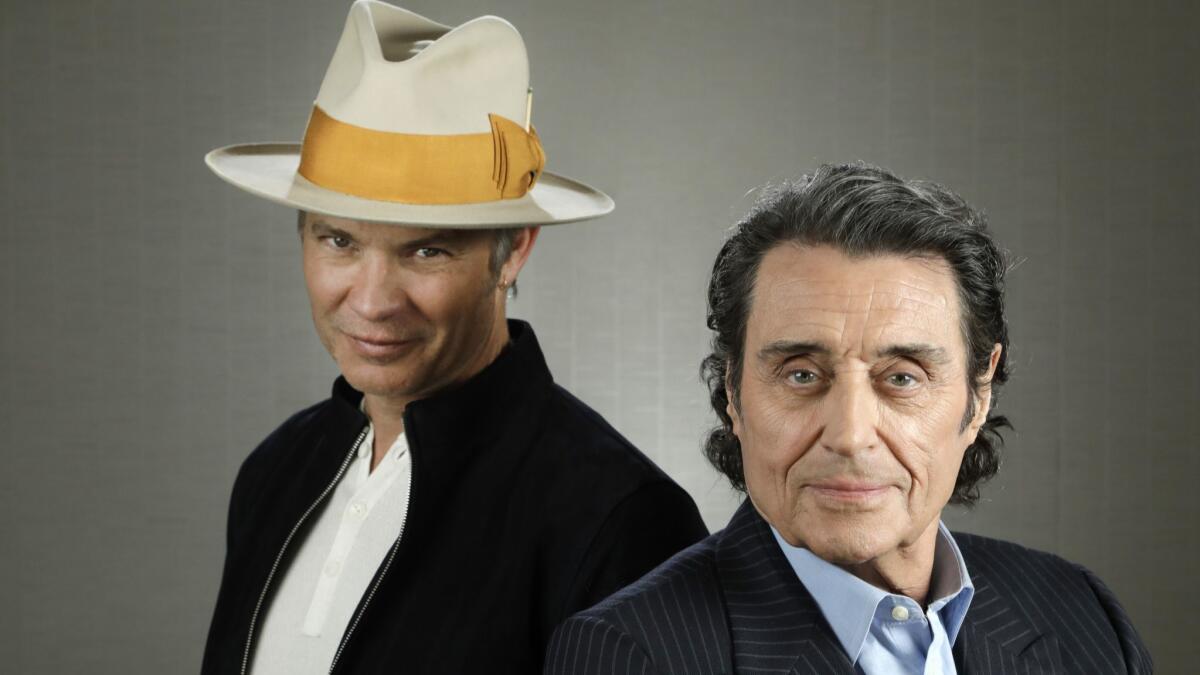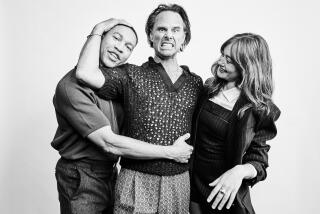Ian McShane and Timothy Olyphant say returning to ‘Deadwood’ was a powerful experience

When HBO’s profanity-laden Western “Deadwood” was abruptly canceled in 2006, the decision to pull the drama after just three short seasons felt as brutal and unforgiving as the series’ namesake. There was no true finale, ultimate showdown or sense of closure for fans.
The series by “NYPD Blue” co-creator David Milch brought the 1870s South Dakota gold mining town to life via indelible characters such as conniving saloon proprietor Al Swearengen (Ian McShane), morally conflicted Sheriff Seth Bullock (Timothy Olyphant), and hard-drinking softy Calamity Jane (Robin Weigert).
“Deadwood” was a bittersweet ode to the misfits and outlaws who conquered the American frontier, and despite the explosion of peak TV in its wake, the brilliantly written series, with its mix of the profane and the poetic, is still rightly considered one of television’s best dramas ever.
REVIEW: ‘Deadwood: The Movie’ marches bittersweetly to the brutal beat of time »
Chances of the beloved series coming back were about as likely as a fresh gold strike in the Black Hills, but fans will find they’ve hit pay dirt when much of the original cast make their long-awaited return Friday in “Deadwood: The Movie.”
The two-hour production is set 10 years later, in 1889, as South Dakota is celebrating its new statehood, marking an irrevocable change for the country — and the camp town. “A [expletive] telephone in my joint,” grumbles the considerably more grizzled Swearengen. “The saloon is a sanctuary. Every man worth their name knows the value of being unreachable,” he says between swigs of whatever it is that’s turned his internal organs to mush.
“I love him to bits,” McShane said of reprising his role as the whip-smart Swearengen, though he says, “It’s a strange thing putting on those long johns again. The striped suit and trousers, slightly too big in the pants ...”
McShane, like Olyphant and most everyone else on the planet, never believed “Deadwood” would rise again. “No [expletive] way I thought it would happen” both actors said in separate interviews during a recent press stop in L.A.
Call it a reunion or a return. Either way, it’s nothing short of a miracle that Milch and HBO were able to reassemble much of the original cast. Trixie (Paula Malcomson), Alma Ellsworth (Molly Parker), Joanie Stubbs (Kim Dickens), George Hearst (Gerald McRaney), Mrs. Bullock (Anna Gunn), Charlie Utter (Dayton Callie), Doc Cochran (Brad Dourif), E.B. Farnum (William Sanderson) and Sol Starr (John Hawkes) and Mr. Wu (Keone Young) are among those fans will see navigating the filth, vice and promise of Deadwood.
McShane was more than happy to be part of that comeback miracle. The terminally dapper Englishman wore a pin-striped suit to the interview and cursed somewhat less than his “Deadwood” character as he spoke about reuniting with Swearengen.
“It all comes back in a heartbeat,” he said. “All of the years. All of the worthy things that he is. All the [stuff] that he’s done, which he’s atoned for a million times, but it will never be enough. But he makes up for it by other [stuff] that he does for everybody else and tries to hide.”
Written by Milch — who recently revealed his Alzheimer’s diagnosis — and directed by Daniel Minahan (“Game of Thrones”), the film picks up where the series left off, only a decade later. Relationships may have advanced or fallen apart, and folks may have moved away, but each figure’s rich narrative arc is artfully connected back to their original story.
Old rivalries are rekindled when Hearst rolls back into town. He’s a one-man monopoly who’s there to buy real estate, political influence and whatever else money and bully tactics can buy.
“I don’t think David [Milch] is capable of writing a story in any era that isn’t about today,” said Olyphant. “I don’t think he knows any other way. It feels like a very relevant story about the passage of time and about coming change. Are you going to be part of the future, and if so, can you take your humanity with you?”
Philosophical and ethical dilemmas are still a large part of life in the lawless camp town, and Bullock continues to struggle with where he stands. He’s a family man, but since his old flame Alma arrived back in Deadwood, he’s having second thoughts. And then there’s Hearst: Why shouldn’t he use amoral tactics to fight an amoral man?
Bullock begrudgingly turns to his old nemesis Swearengen for advice on how to outfox a criminal, and it’s oddly comforting to see how much the two men still despise one another. Through gritted teeth, Bullock recounts how he plans to take revenge, or seek justice, whatever comes first. Swearengen is exasperated by it all: “You ever think, Bullock, of ever not going straight at a thing?”
The dialogue in the film is still an intricate Shakespearean weave of formal speech from the era (which Milch painstakingly researched in historical documents and books about the former camp of Deadwood), roughneck slang, and the personal intimations of Deadwood’s resident oddballs.
When Sol suggests to Trixie, who’s now very pregnant, that they should get married, she scoffs: “Aren’t we still awash in the miracle of a whore of my vintage being pregnant at all?”
The sheer creative quality of the “Deadwood” series is still there. The film plays like two back to back episodes, offering closure without wrapping things too neatly for a show that’s all about rough edges.
But resurrecting the world of “Deadwood” didn’t happen without plenty of hand wringing, mostly by fans with precious memories of the cable series. McShane’s not one of those sentimental folks, but he says the show made him do something he rarely does: go back and watch a production he was part of.
I’m not a big fan of actors saying they didn’t love their performance, but I think I would have done it differently if I was better at the time.
— Timothy Olyphant
“I’m not one of those people who watches old movies, I mean, my own old movies,” said McShane, who’s been in dozens of series and films since “Deadwood’s” cancellation, including “Game of Thrones,” “American Gods” and “The Pirates of the Caribbean” franchise. “It’s like you’ve done that. It was fun. What’s next? But ‘Deadwood’s’ different. I’m always surprised by it. It’s like, wow, Jesus, this was good. God, that music’s great. And that episode, wow.”
Olyphant expressed the same admiration for the series, but wasn’t all that sure about stepping back into Bullock’s boots for the final chapter.
“As much as I admire the show and worship the people that were involved in making the series, it was a stressful experience,” said Olyphant, who was a relative newcomer when “Deadwood” premiered in 2004. “It was very challenging. There was a part of me that thought, I don’t know how fun it would be to go back to that. I’m all for a high school reunion, but I don’t want to redo my sophomore year.”
“The fantasy is that somehow you’ve maybe gained some wisdom or you’re better at your job than you were,” said Olyphant, who among other roles, went on to play U.S. Deputy Marshal Raylan Givens in FX’s “Justified.” “I’m not a big fan of actors saying they didn’t love their performance, but I think I would have done it differently if I was better at the time. I would like to think, and perhaps I’m delusional, that I’m better at my job than I used to be.”
Experience and age has changed most everyone — for better and for worse — who inhabits the Gem Saloon, the Grand Central Hotel, the jailhouse and every other dusty corner of Deadwood.
Calamity Jane is still drunk and in love with Joanie, but she’s beginning to fill the late Wild Bill Hickock’s shoes. Joanie is a successful but not necessarily fulfilled businesswoman. Charlie is a proud landowner, but is tired and contemplating selling. “So much time had gone by I felt like we had a certain freedom that we wouldn’t have had if we’d done [a sequel] earlier,” said Olyphant.
As with any long-awaited series return, or goodbye, expect a mixed bag of emotions and reactions when audiences finally see these vivid characters again. “It’s funny, like many of the folks in Deadwood, people want change but they always complain about things changing. Go figure,” McShane said with a shrug.
Thanks to the series, “Deadwood: The Movie” has already broken through the noise of a new and cluttered TV landscape. It’s all the peak TV that Milch, and his unorthodox Western, informed. “I see the influence of David Milch in a lot of places,” said Olyphant, “but I don’t see anything like ‘Deadwood.’ ”
More to Read
The complete guide to home viewing
Get Screen Gab for everything about the TV shows and streaming movies everyone’s talking about.
You may occasionally receive promotional content from the Los Angeles Times.







